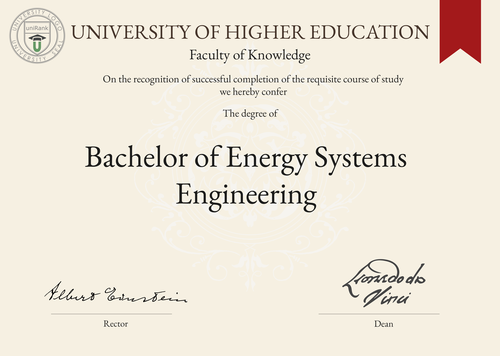
Bachelor of Energy Systems Engineering (B.ESE)
Guide to Bachelor of Energy Systems Engineering Program/Course/Degree
Bachelor of Energy Systems Engineering (B.ESE)

Program Name:
Bachelor of Energy Systems EngineeringProgram or Degree abbreviation:
B.ESEDuration range:
4-5 yearsTuition range:
Varies by country and universityOverview:
The Bachelor of Energy Systems Engineering program is designed to provide students with a comprehensive understanding of energy systems and their sustainable development. Students will gain knowledge in areas such as renewable energy, energy efficiency, power generation and energy management.Curriculum Overview by year:
- Year 1: Introduction to Energy Systems, Mathematics for Engineers, Physics, Introduction to Programming - Year 2: Thermodynamics, Fluid Mechanics, Electrical Circuits, Renewable Energy Technologies - Year 3: Energy Conversion Systems, Energy Policy and Economics, Control Systems, Energy Storage - Year 4: Power Systems Analysis, Energy Management and Auditing, Sustainable Energy Design, Project Management - Year 5: Optional specialization courses, Internship, Capstone ProjectKey Components:
- Understanding of energy systems and their components - Knowledge of renewable energy technologies - Skills in energy efficiency and management - Ability to analyze and design sustainable energy systems - Proficiency in project management and teamworkCareer Prospects:
Graduates of the Bachelor of Energy Systems Engineering program can pursue various career paths in the energy sector. Potential job roles include energy engineer, renewable energy consultant, energy analyst, power systems engineer and sustainability manager.Salary Expectations:
Salaries for graduates in this field can vary depending on factors such as location, industry and experience. On average, energy systems engineers can expect a competitive salary range, with potential for growth as they gain more experience. For a more accurate understanding of salary expectations, you can utilize the Job Sites Search Engine, from our sister site jobRank, which searches over 4,600 job sites worldwide. Make sure to specify not only the job title but also the country you are interested in.Conclusions:
It is important to note that the duration, tuition fees, curriculum, key components, career prospects and salary expectations of the Bachelor of Energy Systems Engineering program can vary depending on the country or location where you choose to study, as well as the specific university you select. Visitors interested in pursuing this degree are encouraged to use the uniRank World Universities Search Engine to find institutions offering this program worldwide.World Universities Search Engine
search for Bachelor of Energy Systems Engineering (B.ESE) and add the Location (country, state etc.) or specific University you are interested in studying at.
Query examples:
- Bachelor of Energy Systems Engineering (B.ESE) United States
- Bachelor of Energy Systems Engineering (B.ESE) United Kingdom online
- Bachelor of Energy Systems Engineering (B.ESE) Australia international students
- Bachelor of Energy Systems Engineering (B.ESE) University of California
- Bachelor of Energy Systems Engineering (B.ESE) University of London tuition fees
- Bachelor of Energy Systems Engineering (B.ESE) University of Sydney scholarships
Share Program/Course
Interesting? Share this program/course/degree info with your friends now.